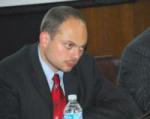
Article: http://www.worldaffairsjournal...
Russia’s 2011–12 election season has begun in earnest. On Monday, the Central Electoral Commission, responsible for organizing the vote, registering candidates, and certifying official results, reappointed its chairman, Vladimir Churov, for a second four-year term. In the presence of Kremlin deputy chief of staff Vladislav Surkov, commission members supported Mr. Churov by a vote of fourteen to one. He will thus remain in charge of both this December’s parliamentary and next March’s presidential elections. Intense media speculation that Mr. Churov, who began his career in the 1990s as Vladimir Putin’s deputy at the St. Petersburg Committee for External Relations, will be replaced by former Constitutional Court Judge Boris Ebzeev, said to be a protégé of Dmitri Medvedev, has, predictably, come to nothing. In the end, Mr. Ebzeev was not even a candidate.
With Mr. Churov’s reappointment, the regime sends the clearest possible message to those who hoped for at least a partial opening of Russia’s electoral process. The chairman’s track record speaks for itself. On assuming his post in 2007, Mr. Churov declared that his guiding principle—his “first law,” as he termed it—is that “Putin is always right.” This seems to be the only law that functions these days in Russian elections. The 2007 parliamentary campaign—the first on Mr. Churov’s watch—was marred by widespread irregularities and fraud. Observers from the Parliamentary Assembly of the Council of Europe, Parliamentary Assembly of the Organization for Security and Cooperation in Europe (OSCE,) and the Nordic Council that the elections “were not fair and failed to meet many OSCE and Council of Europe commitments and standards.” The report noted in particular that “President Putin and United Russia [party] dominated the airwaves during the election campaign with overwhelmingly positive coverage” and that “the state-funded media failed in their public mandate to offer balanced and objective coverage.” Additionally, “the pre-election campaign was marked by the authorities’ clampdowns on opposition rallies and demonstrations” and by the “harassment of opposition candidates, detentions, confiscation of election material, threats against voters, and allegations of the potential misuse of absentee certificates.” The OSCE’s Office for Democratic Institutions and Human Rights boycotted the poll altogether after the Central Electoral Commission limited the number of its observers to 70, down from 400 in 2003.
Advertisement / Reklaam
Advertisement / Reklaam
During the 2007 campaign, the authorities confiscated some 25 million leaflets of the opposition Union of Rightist Forces (SPS) party. According to a study by the Moscow-based Center for Journalism in Extreme Situations, Channel One television devoted 87 percent of its news coverage to Mr. Putin, his United Russia party, his government and other state bodies. The two liberal parties, SPS and Yabloko, received 1.6 percent of coverage between them. Election results were equally impressive. In Mordovia, Mr. Putin’s party initially received between 104 and 109 percent; its official tally was later “corrected” downward to 93 percent. Results in other regions were no less remarkable: 89 percent for United Russia in Dagestan, 96 percent in Kabardino-Balkaria, 99 percent in Chechnya. By the time of the presidential election in March 2008, all pretences were dropped: both candidates nominated by the democratic opposition—writer and former dissident Vladimir Bukovsky and former prime minister Mikhail Kasyanov—were simply removed from the ballot by Mr. Churov’s electoral commission, leaving Mr. Medvedev to “compete” with the domesticated communists and nationalists and a Kremlin-backed puppet candidate.While the upcoming polls are likely to be a repeat of the 2007–08 farce, no sham percentages for United Russia can hide the growing public discontent and fatigue with Vladimir Putin’s twelve-year regime. If the authorities are unwilling to liberalize the electoral process from above, it will sooner or later be done from below. “Cairo yesterday, Moscow tomorrow” is becoming an increasingly popular slogan among Russia’s pro-democracy activists.
























